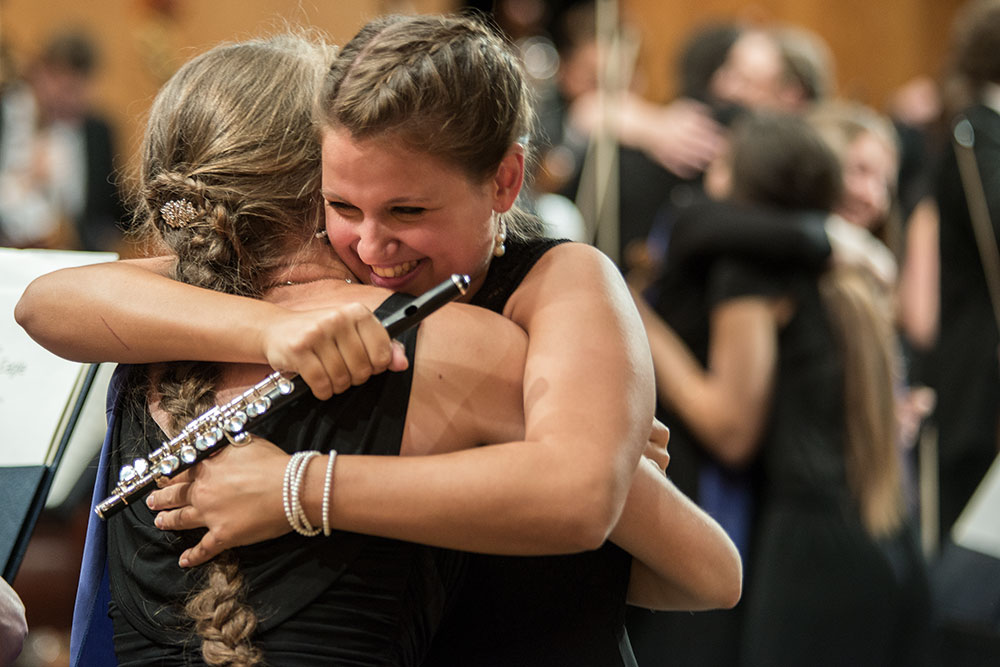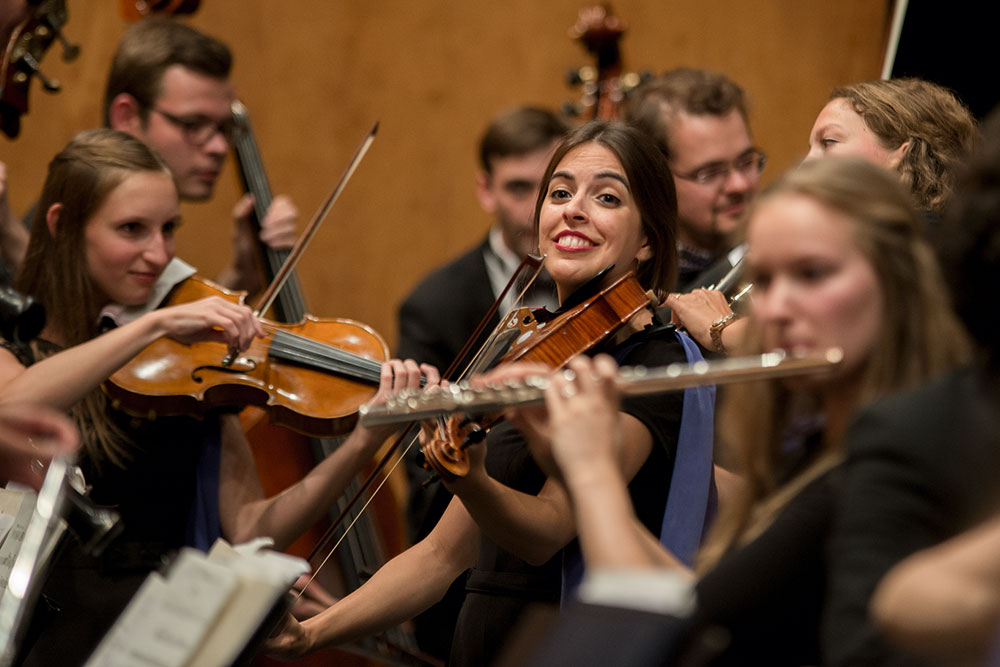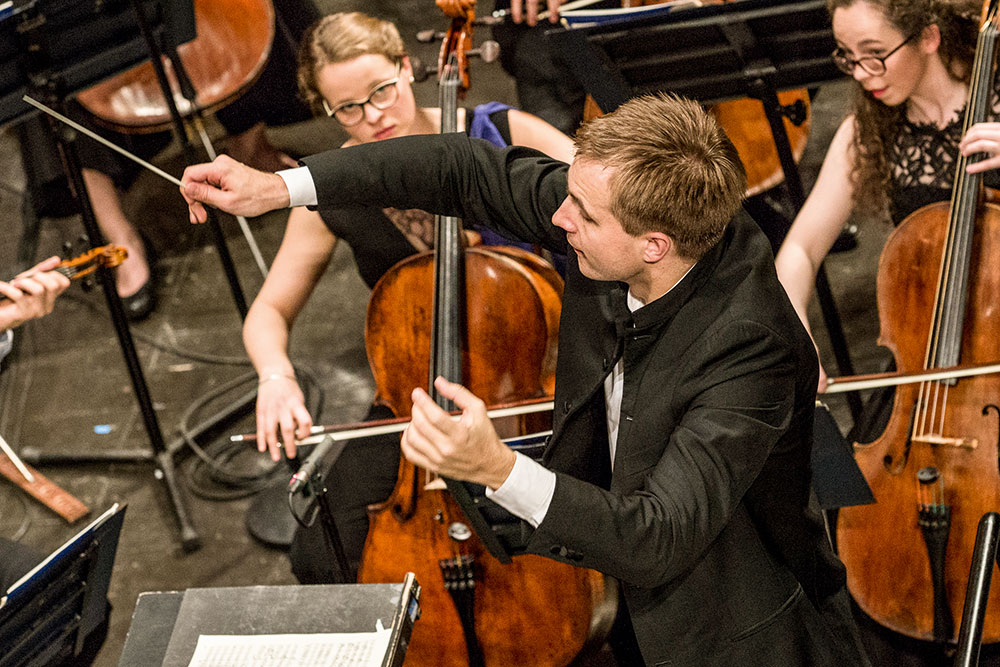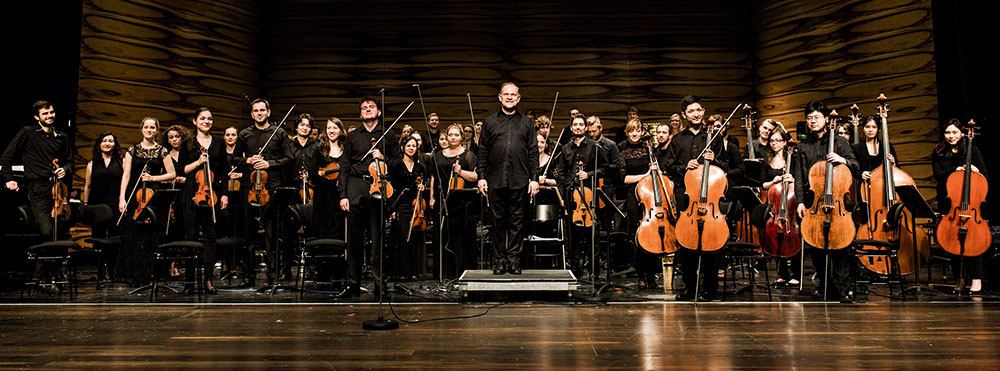„Aufstieg zur Weltbühne“, definierte die mdw im Jubiläumsjahr 2017 einen ihrer Leitsätze. Für viele Alumni verwirklicht er sich, wenn sie als Teil eines großen Klangkörpers, als Mitglied in einem der exzellenten internationalen Orchester musizieren. Doch wie genau dorthin kommen, welche Schritte sind hilfreich oder nötig? Dazu befragte das mdw-Magazin exemplarisch einige außeruniversitäre Institutionen.
So viel ist sicher: Das Studium ist ein großer Schritt von vielen; wichtig ist Erfahrung. Die sammeln Studierende im Rahmen ihres Curriculums unter anderem im Webern Symphonie Orchester, das Opern und symphonisches Repertoire zur Aufführung bringt – einmal jährlich auch im Goldenen Saal des Musikvereins mit angesehenen Dirigenten wie Riccardo Muti oder Franz Welser-Möst (siehe Interview Helmut Zehetner S. 20). Ergänzende externe Angebote reichen von kostenpflichtigen Sommerkursen, Jugend- und Festivalorchestern bis hin zu bezahlten Akademiestellen.

Im Wiener Jeunesse Orchester (WJO) etwa versammeln sich jährlich ausgewählte Musiker_innen zwischen 16 und 26 Jahren aus ganz Österreich. Schon die Probespiele stellen eine gute Möglichkeit dar, Erfahrung zu sammeln: Jede_r erhält Feedback. Geschäftsführerin Renate Böck erachtet neben dem technischen Niveau eine positive Atmosphäre im Orchester für besonders wichtig. Dann erwache der Teamgeist und das gemeinsame Spielen werde zur Freude. Im Übrigen gelte nach wie vor: „Orchesterspielen lernt man nur durch Orchesterspielen.“ Sei es in Hinblick auf die Fähigkeiten des Zuhörens, des Sich-Anpassens, der Kommunikation oder der Sicherheit. „Manchmal macht ein Orchester sich an ein schwieriges Stück und nichts scheint zu funktionieren – aber plötzlich, nach zwei Tagen Arbeit, fängt es an zu klingen.“ Solche Prozesse kennenzulernen, stärke die Musiker_innen auf bedeutende Weise, so Böck. „Wir bieten auch Workshops an. Da wird in Gruppen über Tabus gesprochen. Etwa Ängste vor Auftritten, vor der Zukunft. Das wirkt sehr befreiend und tut der ganzen Gruppe gut: zu spüren, man ist damit nicht allein.“ Über das Netzwerk der European Federation of National Youth Orchestras (EFNYO) ist es Mitgliedern des WJO auch möglich, in anderen europäischen Jugendorchestern zu musizieren – eine horizonterweiternde Erfahrung.

Aus allen EU-Mitgliedsstaaten werden jährlich die Musiker_innen des European Union Youth Orchestra (EUYO) angehört und ausgewählt (und auch dieses Jahr sind wieder mdw-Studierende mit viel Vorfreude und hohen Erwartungen dabei). Die Tourneen kombinieren klassische Konzerte in besten Konzertsälen mit Outreach-Projekten, wie Flashmobs oder Konzerten mit regionalen (Volks-) Musiker_innen. Diese Erfahrungen sind sehr wichtig, erklärt EUYO-Geschäftsführer Marshall Marcus seine Überzeugung. Die Orchestertätigkeit soll interkulturelle Kommunikation und die Fähigkeit der Zusammenarbeit mit unterschiedlichen Menschen fördern – essenzielle Fähigkeiten für Berufsmusiker_innen, aber auch von gesellschaftlicher Bedeutung. „Man darf nicht unterschätzen, wie wichtig es ist, zu lernen, gut mit anderen zusammenarbeiten zu können.“
Ein wichtiger Partner des EUYO ist der Campus Grafenegg. Hier arbeitet man für die Förderung junger Talente mit mehreren Partnern zusammen, vom Jugendsinfonieorchester Niederösterreich zum eigenen, weltweit ausgeschriebenen Grafenegg Academy Orchestra, und ermöglicht so einen Schritt nach dem anderen, erläutert Magdalena Klamminger, Leiterin des künstlerischen Betriebs des Campus‘.

Vermehrt widmen sich auch Berufsorchester der Nachwuchsförderung: Vergangenen Sommer gaben die Wiener Philharmoniker die Gründung einer eigenen Orchesterakademie bekannt, bei den Tonkünstlern arbeitet man am Ausbau der Stellen und Angebote für Akademist_innen.
Auch die mdw setzt in Curricula und Zusatzangeboten wichtige neue Akzente und reagiert auf Veränderungen in den Anforderungen an professionelle Musiker_innen. Das Career Center, der mdw club und das Zentrum für Weiterbildung organisieren u. a. Workshops zu Selbstvermarktung und Karriereplanung. Und ein wesentliches Projekt ist die Webern Kammerphilharmonie. Die Idee, mit einem eigenen professionell organisierten Kammerorchester eine Brücke vom Studium in die Berufswelt zu schlagen, stammt aus Rektorin Ulrike Sychs Zeit als Vizerektorin. Seit 2015 musizieren nun herausragende Studierende sowie Alumni und Alumnae gemeinsam bei internen Anlässen und externen Engagements – zur externen und internen Freude. „Ich finde es toll, dass die meisten Mitglieder schon erfahren sind“, so Mihajlo Radivojević, langjähriges Mitglied und Solofagottist im HRT Symphonieorchester Zagreb. „Es ist gut, dass die Abläufe sehr ähnlich wie in professionellen Orchestern sind, z. B. die Anzahl der Proben, ein_e Chefdirigent_in, verschiedene Gastdirigent_innen. Und das Niveau der Musiker_innen ist sehr hoch“, bekräftigt Christina Hecher, derzeit auch Akademistin der Tonkünstler. Und Radivojević ergänzt: „Durch das Projekt sieht man, dass die Uni sich um ihre Studierenden kümmert.“ Das organisatorische Team um Orchesterbüroleiter Paul Hofmann lacht: „Eine Herausforderung in der Arbeit für die Kammerphilharmonie ist, dass unsere Mitglieder laufend ,wegengagiert‘ werden. Das freut uns natürlich! Es spricht ja für die Qualität unserer Musiker_innen.“

Etliche Fallbeispiele bekräftigen die Bedeutung der unterschiedlichen Initiativen, doch die wissenschaftliche Analyse von Musiker_innen-Karrieren wäre ein wichtiger Schritt, da sind sich Böck, die selbst bereits eine Studie über die ehemaligen WJO-Mitglieder durchgeführt hat, und Marcus einig: „Hierzu brauch es weitere Forschungsprojekte!“ Dadurch könnte man moderne Werdegänge von Orchestermusiker_innen noch besser verstehen und begleiten.

